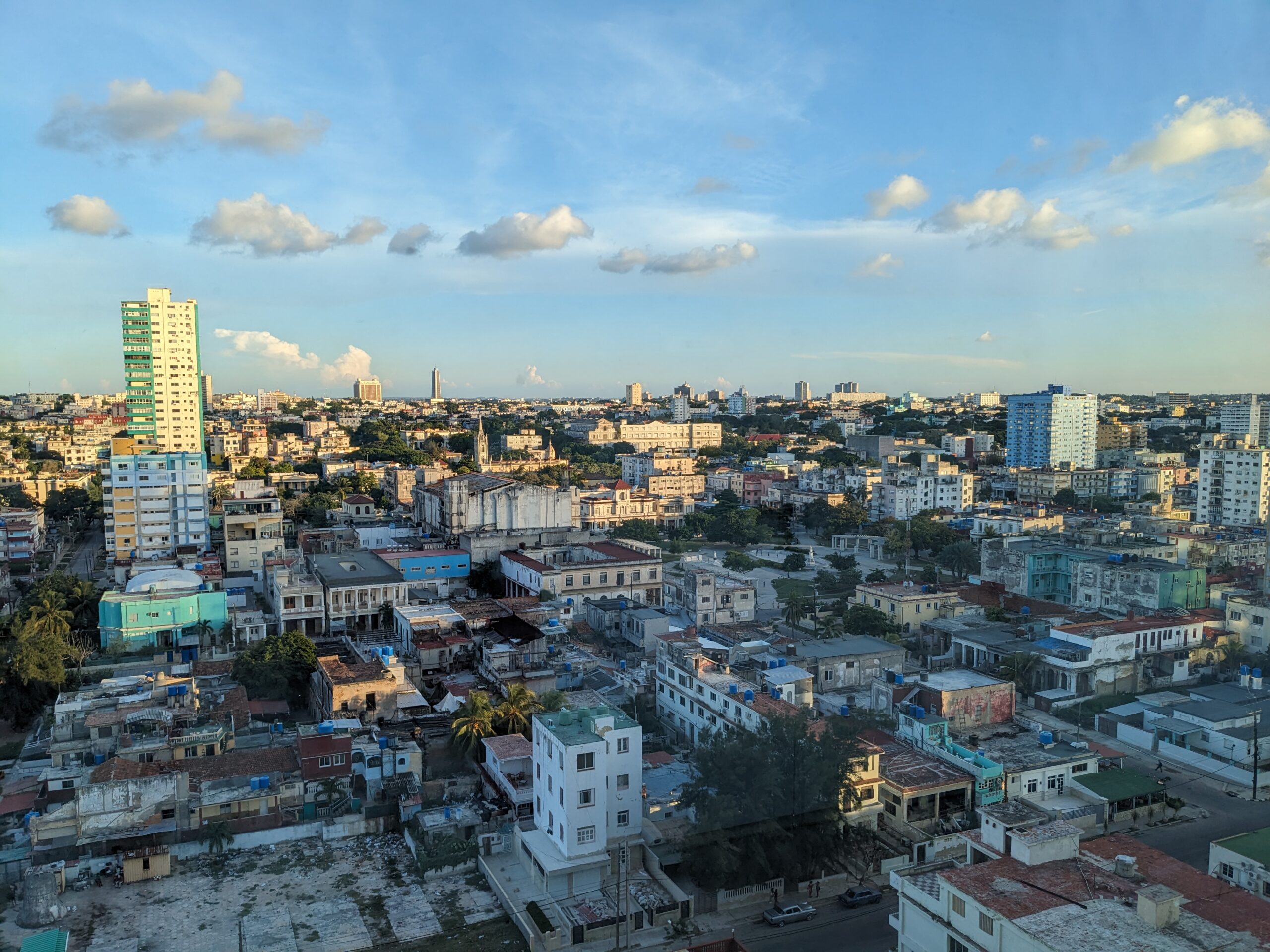This piece was written by Janice Blanchard with input from AFHE Senior Fellows Anjali Singh Kulkarni, Mildred Omino, Oscar Ramírez and Eliza Squibb.
During the AFHE trip to Cuba in September, fellows got to visit a number of establishments that highlighted individual Cubans entrepreneurial endeavors. In recent years, sparked by a 2021 reversal on a decades-old ban on private businesses put in place by Fidel Castro, private businesses have flourished. Now Cubans are allowed to have mipymes — private micro, small to medium sized businesses employing up to 100 people. There are now over 9000 such businesses in Cuba generating over 250,000 jobs.
The private businesses that have emerged range in services, as well as in the background of its leadership.
Nostalgicar
One such business is Nostalgicar owned by Julio Álvarez and Nidialys Acosta. The business started in 2011, with the owner using their 1956 Chevrolet Bel Air to transport tourists. Their business has now grown to a fleet of 11 restored vintage American cars, meticulously and beautifully restored. The visit started with the fellows getting a ride in some class cars to the beautiful retro style garage. Next, Julio—a dynamic and captivating storyteller — shared with the fellows his amazing story and gave a tour of the garage.
“The true patriotic spirit of Julio seen in his determination to make a difference to Cuban People through his private family business despite the harsh economic realities was mesmerizing.”
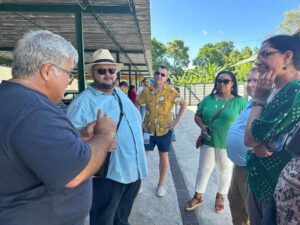 These are the words of Mildred Omino (AFHE 2020 cohort). Julio narrated how he had made several attempts to have a bank account in the United States, all which were an exercise in futility. While this is a hurdle in importation of motor vehicle spare parts necessary for keeping his business afloat he is determined to soldier on with optimism even as he hopes for a day that the banking processes would be favorable for US dependent enterprises like Nostalgicar.
These are the words of Mildred Omino (AFHE 2020 cohort). Julio narrated how he had made several attempts to have a bank account in the United States, all which were an exercise in futility. While this is a hurdle in importation of motor vehicle spare parts necessary for keeping his business afloat he is determined to soldier on with optimism even as he hopes for a day that the banking processes would be favorable for US dependent enterprises like Nostalgicar.
The ability of Julio and Nidialys to leverage on their different professional attributes is a pillar of Nostalgicar, Julio brings his technical expertise as a mechanic coupled with high negotiation skills which are then complemented by Nidialys’ strong managerial and administrative skills drawn from her chemistry teaching experience.
Midred’s two takeaways from the conversation with Julio is the significant business ethics and ethos that continuously guide Nostalgicar; One, fidelity to the tax regulations by remittance of taxes as stipulated by the government and two, recognition of the people who support the evolution of the business idea throughout the business life. It is incredible to learn how each of the restored cars had a symbolic name that resonated with some key highlights of the Nostalgicar.
Anjali Singh Kulkarni (2018 Cohort) noted in her conversation with Julio that he mentioned that he pays about 11% taxes on his earnings but that taxes can go up to 35% of profits. He also contributes to the pension fund of his employees. Julio envisions that future governments of Cuba will encourage business development and begin levying taxes to foster greater development of Cuba. Julio is clearly an entrepreneur who wants to contribute to the development of his country through business. Through expansion of business he is creating job opportunities for young Cubans thereby enabling young people to find appropriate employment. His perspective on equity is enabling people to earn a respectable living through gainful employment.
Velo Cuba
Another entrepreneurial site visit included a bike ride with VeloCuba. The owner Nayvis Díaz Labaut spent some time with our fellows telling them about the history of VeloCuba and how it went from a staff of two people to now over twenty people — the majority of them women.
“VeloCuba is a project that surprises from several perspectives. First, there is a vision of reactivating bicycle transportation locally, which has an ecological and social aspect, as it allows for greater facilities to be provided to the population,” Oscar Ramírez (2021 cohort) said. “It is also a space for women’s empowerment — an activity that in the midst of Cuban society (and perhaps many parts of the world), was not very common (seeing women fixing bicycles and even building ones).”
VeloCuba started out as a place for people to bring their bicycles if they needed repairs or a tuneup, and it has turned into a full bicycle workshop and bicycle sharing organization where locals and foreigners can come rent bicycles to run errands, do work or just see the city.
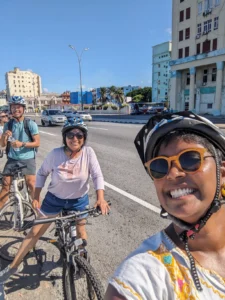
Oscar was particularly interested in the different ways VeloCuba served its community.
“They have spaces with children to teach them how to ride bicycles (and offer them discounted rental prices) and with a good local industry, they are planning to build bamboo bicycles, which would be an excellent option,” he said.
Labaut sees bicycles as a way to deal with resource issues in Cuba as well as an environmentally-friendly way for Cubans to be able to meet their everyday needs. A group of fellows were taken on a bicycle tour by Velo Cuba staffers along the Malecón. Velo Cuba offers these tours to visitors to help support their business model and pursuit of a socially and environmentally sustainable business.
“It’s an excellent way to see the city, very fun and relaxing,” Oscar said.
Clandestina/Printmaking
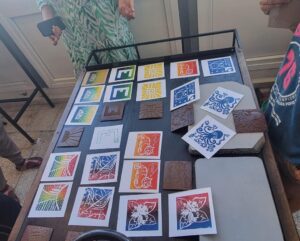
Fellows also got to explore the artistic shop that houses Clandestina, Cuba’s first independently-run sustainable fashion brand. Clandestina was founded by Idania del Río and Leire Fernández and is now a collective of various fashion designers and artists from diverse backgrounds in Cuba. The fellows visited the store in Havana, but there are now also stores in the US, after the founders of the company designed the Google Chrome t-rex.
Ten fellows visited the shop on the site tour and were able to each create their own design and then get a custom print made in the shop that day.
Eliza Squibb ( 2019 cohort) shared her impressions of the experience: “We walked through a cavernous warehouse on the edge of the port with rows of paintings displayed ten feet up. At the back of the space, the Clandestina team hosted us in their workshop and bar. We carved our drawings on rubber stamps for a simple print-making technique, it was a chance to decompress and play around with shapes and colors with other fellows. “
Finca Marta
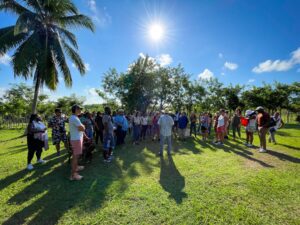
A different type of enterprise that the fellows visited was Finca Marta, just outside of Havana. Founded by Fernandito Funes Monzote who completed a doctorate in Holland in agroeconomics, Finca Marta is a model of sustainable agriculture. Fernando finished his PhD from Holland, gave lectures around the world but could not find answers to his quest. That is when he decided to dig his hands in farming and do work on the ground, engaging people and getting involved in collective work, collective earning and collective happiness. Established in 2011 initially with just 8 hectares, the farm has grown to 20 hectares and is now a collective of several individual farms across the country. He began farming with about 8-10 people. Now he has more than 30 people working with him. The farmers grow and sell to restaurants as well as residents to sustain a living. The farm also has honey bees, chickens, horses, ducks and several resident dogs that seemed to enjoy the fellows’ visit. Monique Brown (2020 cohort) wrote more about the Finca Marta visit here.
According to Fernando, farming is more about engaging with the society. It is not a cooperative but a social enterprise. Fernando wishes to extend his farming area so in the future, he plans to request that the Government will give him an additional 40 hectares so that he can engage more farmers and thus contribute in Cuban employment as well as Cuba’s own farming products available in the local market.
Conclusion
Of course, there remain a number of challenges to Cuban entrepreneurship. Challenges include brain drain, in which many young Cubans and those that work in state run sectors leave the country in search of other opportunities. Many Cubans also note the embargo often prevents the importation of raw materials that are needed for business operations and fuel sources on the island that is a critical part of daily operations.
There is also an issue of equity. Many Cubans on US soil have historically sent remittances to families back home that have supported many families’ basic needs. This has disproportionately affected some families in Cuba contributing to an economic divide. For example, 44% of white families in Cuba receive remittances, as compared to only 23% of black Cubans. Some argue that differential access to such remittances that fuel the start of independent businesses may widen such gaps in entrepreneurship opportunities as well, so it will be important to monitor this as the boom continues.
It is also unclear what this will mean for Cuba’s relationship with other countries, including the United States, a close neighbor. Congressman Joe Garcia recently organized a workshop for 70 Cuban entrepreneurs in Miami, one of the first of its kind. The conference explored expansion of Cuban businesses and working given current embargo conditions.
It will be interesting to see the future of entrepreneurship in Cuba and how it further transforms the Cuban landscape. We look forward to exploring some of these challenges.
